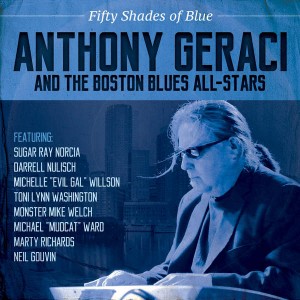 Anthony Geraci’s latest solo album Fifty Shades Of Blue isn’t just a solo album. Although Geraci has written and produced every one of the exceptional songs, he has a high caliber cast of characters along for the ride. That’s why he calls his band The Boston Blues All-Stars. Aside from his Sugar Ray And The Bluetones band mates, Geraci has also recruited drummer Marty Richards and vocalists Darrell Nulisch, Michelle Willson, and Toni Lynn Washington. Great songs sung by great singers is often a promising start and this CD is full of much more than just promise.
Anthony Geraci’s latest solo album Fifty Shades Of Blue isn’t just a solo album. Although Geraci has written and produced every one of the exceptional songs, he has a high caliber cast of characters along for the ride. That’s why he calls his band The Boston Blues All-Stars. Aside from his Sugar Ray And The Bluetones band mates, Geraci has also recruited drummer Marty Richards and vocalists Darrell Nulisch, Michelle Willson, and Toni Lynn Washington. Great songs sung by great singers is often a promising start and this CD is full of much more than just promise.
Darrell Nulisch graces Opening track “Everything I Do Is Wrong” with his steady soulfulness, his tender vocal mining the depth of this song. Nulisch takes the listener down deep into the heart of the matter and brings the message back up with an understated expression that makes the feeling loud and clear. This number is also buttressed by Monster Mike Welch’s brittle, tender guitar phrase, a line so light, high, and emotive it will make listeners cry.
Title track “Fifty Shades Of Blue” will likely become known as Michelle Wilson’s “Handcuffs Song.” Wilson and Sugar Ray Norcia duet on this tale of lust and playful kinkiness. Willson’s sultry timbre and playful delivery balances well with Norcia’s more forceful belting. Meanwhile, Geraci’s jaunty piano line more than hints at what’s going on, something that results in two people reaching 50 shades of blue. It’s just a fun suggestive song that should receive airplay real soon.
Norcia continues the lead vocal mission on “Sad But True” and his harmonica work flavors this piano driven shuffle with something tasty and deep. Welch kicks out some scratchy guitar lines that work in beautiful partnership with that seriously unfurling layer of heartfelt harp grind. This track is so rooted in Chicago style that a blues purist could listen to over and over again and swear it was recorded at Chess studios back in the day.
Geraci boogies his way right into “Heard That Tutwiler Whistle Blow” with layering of smoky piano notes that builds a dramatic scene. Norcia is still on lead vocal duty here, emoting about the dream of finding work at Mr. Ford’s automobile factory. Escaping a scenario of lynching and other strife, this song’s narrator paints a vivid motion picture in the listener’s mind while making one feel his determination. Norcia unfurls his gut wrenching tale with his gritty timbre and soulful belt. He seconds that emotion with a stomping, punctuated harmonica line that makes one feel his past struggles, shifting from peaks to valleys in his harp line. Every note here is tastefully rendered and it should go over well with any fan of the Chicago blues idioms.
Michelle Willson does her thang on “If You Want To Get To Heaven.” With a swinging sultriness that can’t be beat, she milks each verse for all its longing, forlorn worth, bemoaning her fate of abandonment like a woman who can’t go home again. Her earthiness makes it real and most of this action pack song hangs together very well, swinging around its beat with forceful momentum.
A breezy down tempo blues number, “Don’t Keep Me Waiting,” finds Norcia in the role of old school crooner. He coaxes plenty of emotion out of this tune while phrasing with a nuanced precision that reminds of Frank Sinatra as much as Charles Brown. Mr. Geraci flavors this graceful waltz beautifully. His layers of tender ballad style piano and smoky organ riffs make this one feel like something recorded in 1950 and is already included in numerous anthologies.
Geraci gets more into his aggressive side on “The Blues Never Sleeps.” He taps out a feisty melodic line in which each interval of notes slaps the song briskly forward. Nulisch’s harmonica run is another engine driver and the entire shuffle stomps its way in a persistent direction. Geraci doesn’t reinvent the wheel here. He just rolls it with style.
“Too Late For Coffee” finds Norcia in the role of conductor, driving this country blues piano ballad through pleasant pastures with his strong but gentle croon. He’s heading back home for the woman he hasn’t seen in months, and Norcia makes us feel that longing, anticipation. It’s a beautiful love song, excellently executed, brilliantly paced, and passionately sung.
Toni Lynn Washington handles the lead vocals on “Diamonds And Pearls,” a mid-tempo blues number that lets her strut her stuff. Ms. Washington layers her rich timbre over a thumpy beat, brisk piano rolls, and a frisky guitar phrase. An instrumental break lets Geraci and then Welch showcase their juicy melodic lines, each putting their notes through hoops to keep things jumpy, juicy, and sweet. Washington sings this with a swagger that easily matches the fine instrumentation jumping around her character-rich vocal.
Nulisch is back at the microphone for “Cry A Million Tears.” At his emotive best in the way he sings it here, laid back, unobtrusive, he finds his place politely amidst the melodies and groove. It’s uncanny how well he massages the emotional message out of this song with his tasteful self-restraint. An understated electric guitar line from Welch offers another layer of emotion while Geraci’s piano and organ carry a wide, unadulterated, unresolved sadness. Geraci knows how to compose a blues song with tremendous feeling and how to bring it to life with the perfect line up and the perfect arrangement.
Geraci also knows when its time cut loose and get everybody on the dance floor. I dare anybody not to move their feet to “In The Quicksand, Again.” I dare you. I double dare you. This instrumental moves with a speedy display of instrumentation that stimulates the mind while the rhythm section delivers a groove and backbeat impossible to resist. It’s a bit flashy, but it’s also well constructed. There’s greasy guitar spikes and bopping piano to motivate you even more.
Norcia turns in another beautiful vocal performance on “Your Turn To Cry.” This dandy is another of Geraci’s Charles Brown influenced blues ballads. The keyboards practically swell with emotion while Norcia tenderly rides the rails created by Geraci’s organ progression and nuanced piano line. Norcia also pulls out his harmonica for a further tumescent tenderness, landing in a sweep spot with his seasoned harp line.
Geraci closes out with an instrumental tribute to another area keyboardist who took the blues far and wide. “Blues For David Maxwell” offers beauteous blues piano tinkling, notes that build and cascade with a large sense of meaning and purpose. Welch’s guitar whispers a sense of loss in the backdrop with its muted briskness as the rhythm boys give it all a gentle push. Each time Marty Richard’s stick hits his drum rim the listener can feel himself falling further into the sense of loss, mourning, reverence, and warmth that abounds in this hearty salute. If all that wasn’t enough, Michael “Mudcat” Ward takes over the beat duty with a thick, wholesome low end plucking, supporting Norcia’s Native American flute, an instrument that offers beauty, spiritualism, and exotic melody all at once. A perfect tribute.
Geraci and his band of blues gangbusters and sultry bombshells have come up with a dynamite album. Fifty Shades Of Blue is just bursting at the seams with crackling, energetic up tempo blues and swelling emotive ballads. Geraci has certainly distinguished himself as a songwriter, composer, and arranger of the highest order. Blues fans need to buy this album right away.

